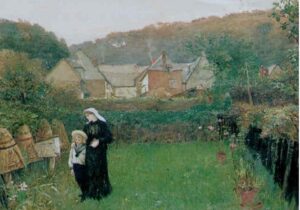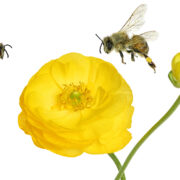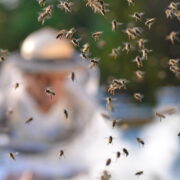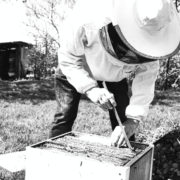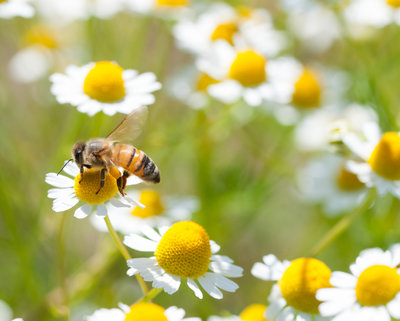Telling the Bees
“The Widow,” by Charles Napier, 1895. Is she “telling the bees?”
We have learned plenty about Queen Elizabeth II and her long and illustrious life since her recent passing, perhaps more than we care to know. For instance, who knew that The Queen kept bees? Believe it or not, the royal palace maintains five colonies and employs their own “royal beekeeper.”
Apparently, these royal colonies not only had queen bees of their own, but a human queen as well!
One of the many royal traditions that occurred in the wake of The Queen’s death, was the practice of “telling the bees.” In this time-honored tradition, someone who is close to the deceased approaches the beehives to notify the bees that their beekeeper has passed away. Surprisingly, this practice has been documented in many old-world customs. Telling the bees about their beekeepers’ deaths has been a traditional practice for centuries, especially in European countries.
Which begs the question – do bees know their beekeeper well enough to care about their passing? Bees – and insects in general – are used to death and seem to be indifferent when their cohorts die, which happens all the time. When an individual honeybee in a hive dies, the bees don’t seem to mourn in any way. They move on instantaneously and seem to go about their business as if nothing has happened. One must wonder whether their behavior would be any different if their beekeeper dies.
While the rational and scientific answer appears to be that bees don’t care about their beekeeper, the notion also remains that bees maintain an acute sense of their surroundings. They also seem to be aware of the overall energy of what takes place around them. For example, bees tend to get agitated during inclement weather, or when there is a lot of activity or disturbances near them.
It’s well-known that experienced beekeepers are stung less than those who are inexperienced. This is because experienced beekeepers know how to move smoothly and calmly around bees. Inexperienced beekeepers tend to move erratically and nervously around bees, which causes bees to get stressed and sting. This is an indication that the bees have some perception of the unique qualities of different beekeepers that work with them.
Is the idea that far-fetched? Surely racehorses know when a new jockey is in the reigns. We know that nearly all pets become attached to their owners and would become aware of their absence. Here at Wildflower Meadows, it seems to us that the bees have developed a certain comfort level with the beekeepers that work with them regularly. Perhaps they can recognize the mannerisms and overall energy of the beekeeper that has genuinely cared for them throughout the years.
In many ways pets are family – and for some, bees are their pet of choice. If they are a part of the family, then they deserve to know about changes that are taking place within the family. Perhaps it is only a matter of simple respect for the bees, to at least attempt to let them know that a significant and permanent change is in the wind. They will be getting a new beekeeper, with a new face, smell, and a new way of doing things. Perhaps they should know that.

